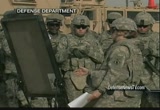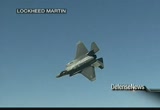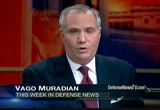tv This Week in Defense CBS January 16, 2011 11:00am-11:30am EST
11:00 am
more discounts than ever before. and they still get great service. ♪ ow! [ disco music plays ] ♪ whoa, yeah is it just me, or is it getting funky in here, huh? get your groove on, y'all! catch you on the flip side! i'd tell him the sign's not finished, but it would just break his funky little heart. more discounts, more ways to save. now, that's progressive. call or click today. this is my band from the 80's, looker. hair and mascara, a lethal combo. i'm jon haber of alto music. my business is all about getting music into people's hands. and the plum card from american express open helps me do that. you name it, i can buy it. and the savings that we get from the early pay discount has given us money to reinvest back into our business and help quadruple our floor space. how can the plum card's trade terms get your business booming? booming is putting more music in more people's hands.
11:02 am
next on this week in defense news, in welcome to this week in defense news. i'm vago muradian. defense secretary robert gates wants to cut $154 billion in pentagon spending over the coming five years, half of which would go back into buying weapons and funding people. to do that he'll have to convince representative buck mckeon that his plan makes sense. the ten-term california republican said defense spending should be increased if possible, but the top two republicans in the house, john boehner and eric canter have
11:03 am
said defense cuts needed to be considered. mckeon's district includes lockhead hartin and bowing and edwards air force base, china lake and the marine logistics bake in barstow. in the first interview since becoming chairman, i asked him if defense cuts should be on the table? >> i think that the leadership has said everything has to be on the table. i think probably what we need to talk about is what does that mean, being on the table? the secretary has said for a year now, he's been selling the service chief, we want to come up with $100 billion in savings, but when you find the savings through different efficiencies we'll let you keep the savings. we had a briefing last week that departed quite a bit from what we had been hearing. and i was quite concerned. i was shocked really to hear some of the numbers that he was talking about. we haven't seen the details of
11:04 am
that yet. but basically what he was saying is the $100 billion that he had been asking the service chiefs for, they have found those efficiencies. and they are going to be able to keep $70 billion of it, but they're going to have to use $28 billion of it to pay for must-pay things. so basically the $100 billion that they were going to be able to keep for modernization or for things that they found more important, they are going to be able to keep 70% of that. >> but there were many analysts in washington that were convinced the white house has taken all tv from them, but the white house has allowed them to keep that money and the topline increases over time. and folks are going to try to dig more savings out of this budget. what are specific proposals in it that are concern to you? >> i thought when we went into the briefing we would hear about the $100 billion and details on it and how they were going to take the savings that they had found to do more of
11:05 am
the modernization and the things that they need. in addition, the secretary laid out that he had found another $78.5 billion that they were going to cut the budget. so if you look out ahead, what they have been talking about is 2-3% increase every year to keep up inflation for the next five years. now what he's saying is that the next year they'll have a 1% increase, the next year a half percent and the following three years no increase. and that they will be taking down floor size by 2015. so we're talking now different weapons systems, we're talking about reducing force size and we're yet to receive all of the details. we'll be hearing that. staff will be briefed i think later today. >> and is that why you characterize it as drastic and
11:06 am
dangerous. >> i think so. when we are fighting two wars and we still have 50,000 troops in iraq that are supposed to be brought home the end of this year. we still have a war going on, a very dangerous war in afghanistan and pakistan on the border. we understand it's very important. we see things that china is doing and north korea is doing and it just seems to me that history repeating itself over and over and over in my lifetime is happening again. >> obviously the administration would say they are are reordering priorities to deal with the anti-access from china and in terms of the development of a new bomber and i'd like to talk about that later. but you're talking about having your own review on military spending. what are things you think you can cut and where are the areas you'd like to actually see more money spent? >> i would like to get into -- through our hearings and some at subcommittee level and some at full committee level, i
11:07 am
would like to look in detail at the $70 billion that the services found -- or the $100 billion that they found and really look and see if we agree with them on that. in the past there have been things -- people say well why are you fighting to keep this, the military doesn't even want it? the f 117, the predator, body armor, there are a lot of things that we have found that congress has instituted and the military hadn't asked for or didn't -- maybe didn't want that we found very useful. and the thing is that the members of the armed services committee have a responsibility, they have a constitutional responsibility to provide for the common defense of this nation. and we take that very seriously. but it's like the department kind of -- and the administration treats the congress as just an unnecessary
11:08 am
evil that they have to put up with and they give us what they want to give us when we hold hearings and ask them for information, many times it's not forthcoming. and they ask us to just rubber stamp, go along with what they say. if they want to cut something, we're just expected to go along with it. and then they try to make us out like we're the bad guy and we're pretending that we're keeping these things just for jobs, not to strengthen our defense. >> let me take you to the question which is a big one of pay personnel and benefits for active duty folks and retirees. republicans have said all along that we are stronger on national security issues and tougher on it and can take on this kind of reform. now is this the kind of reform you'll have to dig into as well. >> i think we have to look at everything. and that's why i say, when we say -- or when leadership said that everything is on the
11:09 am
table, i think we need to look at defense. the taxpayers' dollar to me is sacred and should not be wasted. so therefore we're going to hold hearings and look at everything. and that would include benefits and the cost of health care to retirees for instance hasn't been raised in over a decade and costs have sky rocketed. >> do you support secretary gates on that? this is a third rail issue in politics but everybody is raising a fairness question. >> i think we need to look at everything. i'm not supporting anything until i see the details because i told the secretary a few months ago, we were at breakfast and i told him that i supported the concept of finding the $100 billion in savings for the reason i just mentioned, nothing is sank row
11:10 am
sank. no dollar can be wasted. by the same token, when you are fighting two wars, it's difficult to vote for any type of cuts to the defense department. i think we should find where they can save, but there are other things that they probably are crying for things that they need. i know the history of this committee. we've asked the chiefs at the end of the hearing process what do you really need and i remember the marines saying, well we could use more bullets, we could use tents to people out of the weather. those are basic things. >> but they're playing it a little bit slick because they know when they come up here and ask for that, you'll give it to them. >> i understand how that's played. we put things in the budget that are tougher and then the things that are -- you can't turn down we leave out, waiting for the question. but by the same token, how do you say -- how do you say no to that and then the things that
11:11 am
they have in the budget that they have needs for -- i think one of the things i want to do is put the committee on a war footing. i want to make sure they understand we are at war. the ones sacrificing for the war are the military, they and their families. and i've told our leadership when i requested this job that i looked at the job as being one to make sure that our military has everything they need to carry out their missions and to win and to return home safely to their families. now if we think we can shortcut that and give them part of what they need, i'm not going along with that. up next congressman
11:13 am
we're continuing our conversation with the republican congressman buck mckeon in his first television interview since becoming the first chairman of the house committee. he has said the united states tries to hard to make things perfect. secretary gates has used a similar rational to cancel the expeditionary fighting vehicle. i asked the chairman if he supported the secretary's decision? >> we've been working on this
11:14 am
since the 80s and now we decide it's too expensive. i understand that -- >> and he said not needed, given the threat. >> it's still listed as one of the needs that the marines have, to get from the boat to the shore. and the navy said they will only come 25 miles and to put them on a vehicle that goes 3 miles per hour to go 25 miles. >> 5 miles per hour to 30 miles per hour is a difference. >> and expect them to be on shore and then be able to fight. >> is it the program or the capability? they launched a program the same day called new amphibious vehicles? >> because the capability is still needed. >> right. >> and so what they are looking for i guess is something going to be lighter, leaner that can carry out the responsibilities. i have a problem with the whole way we buy things. we start out with a set of what
11:15 am
we want to have at the end of the day. and then as the day goes on, we keep changing those requirements, increasing the requirements. we start out with a plane that a certain engine will handle the job, and then we keep adding on weight and then we have to come up with a different engine. and it's like, if you build a house, as soon as you start change orders the cost goes up. >> and the cost is driven by change orders. but is over sight a problem where there is too much paperwork associated with some of this stuff? >> back to what i said. we ask them for things and they don't give us things and it makes us hard to do our oversight. and we'll focus on that. when we ask for something we expect it. we're a full partner in this. and we have a responsibility and we don't just rubber stamp what the department said. >> so you want to see more details on it before you decide whether --
11:16 am
>> before we embark on a project, where we are going to spend billions of dollars, let's decide are we going to at the end of the day spend the billions of dollars. >> can i take you now to bomber. while the marine corp lost the bomber, some have said long range strike missiles are a better way of doing that mission. where do you stand on the new bomber? >> when i came to congress we were building the b 2 in my district. it was supposed to be 130 planes. they had cut it down to 20. we got one more and we crashed that and so now we have 20. $40billion was spent on the plane. if you spread that over 130 planes you get one cost and if you spread it over 20 you get a whole lot more cost and a different plane. then we repeated the pattern with the f-22. we were supposed to have 750 and now we're down to 278.
11:17 am
and we said we can fill in with the f-35. we'll be back i'm sure at some point wanting to cut the number of those down. i remember when we had that debate on the b-2 and i said, what are we going to replace it with? at some point you stop flying them. 100 years or 150 years, pick a time. and the chairman said we'll come one a new bomber. and i found out last year that we already had a long range bomber we were working on through darpa. they got canceled in the last budget and now we start another one in that budget. >> it's only a couple of billion dollars each. >> i'm saying, let's sit back and take a breath and say what are our threats? what do we need for those threats and are we going to start a project that we're go fog finish or just -- we're going to finish or just start and stopping and cutting. >> what do you see as the most
11:18 am
important threats? >> well right now i would say probably afghanistan is a pretty important threat. we're not totally finished with iraq. i look at iran, i look at china in pushing back their access and the things they are doing. we've sold weapons to taiwan for years. last time we talked about selling them f-18s, china got pretty upset. we said why? we've been doing this. and they said we're stronger now. the actions that they are taking will have consequence. and the last qdr we went out about five years, we should look at where we will be in 15, 20 years? >> but this administration has been much tougher in its tone than the predecessor has been? >> so is china backing off? are we preparing ourselves for -- can we move our carriers in?
11:19 am
can we protect taiwan if they attacked them today? i look at north korea, i mean, the things that they are doing while we're cutting back our missile defense. some of the things just don't really make sense to me. i understand the budget problems. but i think that what we should be looking at is what are our defense needs and how do we come up with the money to handle it? not how much money do how will the new republican chairman of the house armed services committee work with democrats
11:22 am
recent tragedy in tucson will soften the divide between republicans and democrats. but the house armed services committee has lost democrats in the last election prompting some to say it will be harder not easier to receive bipartisanship on the committee. adam smith of washington is the leading ranking democrat. i asked mckeon how he and smith planned to run the committee. >> i've reached out to adam and we're going out to his district and my district. he and i and members of the committee. and it will give us a chance to stress the importance of bipartisanship that gives us a chance to interrelate and talk to other members and get to know other members better and a chance to see where we're going to ft. irwin or my district and ft. lewis in his district and the air force base, submarine base. so we'll be able to see a lot and get to know each other better and set a tone for this
11:23 am
congress that we're going to continue to be bipartisan. this committee has a culture of it and we'll continue it. >> let me take you to the question of the budget. secretary gates has said that they need a full year appropriations bill and we're still operating without a 2011 defense budget. you said you would go to leadership on the appropriations issue. where are we going to be on the appropriations issue and on getting the 2011 defense budget? >> i talked to mr. lewis about it. he'll work closely with mr. young and the defense folks. the problem is separating defense out of all of the other spending and giving them a special status which i think they deserve. but so do other people think so about their committees. they already tried an omnibus bill that didn't work separating defense out, while i understand it would save us money in the long run and be better, i'm not an appropriator. i'll continue to discuss it and work with the appropriators, i don't know how it will be at
11:24 am
the end of the day. >> but the fact we haven't been able to deliver a 2011 budget is there a concern for 2012 now? >> i don't think so. we have new leadership. they didn't pass in the last -- in the last congress they didn't passoy budget or any appropriation bills. i've never seen anything like that since the time i've been in congress. i heard it's the first time we haven't had a budget passed since the budget resolution was passed in the 70s. we have a new leadership and budget committee chairman and bringing the appropriation bills to the floor under open rules. it's my hope and i think will happen, we'll have a budget passed and we'll have appropriations bills passed. >> i want to ask you about afghanistan. you're going there soon. vice president biden was just over in afghanistan and said the troops will be staying past 2014. do you support troops staying longer than 2014 and do we have enough troops there now? >> i think we're getting kind of out a little bit far to be talking about that.
11:25 am
the president already said they're going to start bringing troops home in july of this year. i think we need to see what he does at that point. i'm looking forward to talking to general petraeus and we'll have him testify before our committee. i think there are a lot of things that have to happen just in the -- within the last few months is when they set the date out to 2014. i think there is a lot of things that have to happen before then. i appreciate the vice president's comments that they may stay later if they're asked, but i think we really need to look at it. they're going to keep cutting the defense budget and not giving our troops what they need, i think we ought to be looking at how we have our troops out there protecting our interests if they are not going to be giving the stuff they need to do that. >> sir, thanks very, very much. we really appreciate it. >> thank you. >> up nex
11:27 am
defense secretary robert gates went to china last week to resume military to military links with beijing. links china severed last year after washington sold arms to taiwan. americans see this as vital of averting potential misunderstanding. china views them as bargaining chips in a relationship of which it sees america on the decline. beijing remained with -- links. they flied the new stealth fighter for the first time.
11:28 am
it is among a wide array of challenging superiority. including a new missile to sink aircraft carriers. china's president who will be in washington soon was surprised and suggesting a worrisome disconnect. chinese leet lead -- leaders say they pose no threat to the region and seek a military befitting the economic might. but sweeping territorial claims and lack of transparency and new weapons makes it clear china intends to displace the united states as the leading power in the region. washington must continue to engage china but make clear to beijing and it's regional allies that it will live up to its commitments, keep engaging allies and reshaping military capabilities to deal with future threat. thanks for joining us for this week in defense news. i'm vago muradian. you can watch this program online at defensenewstv.com or e-mail me at vago at defensenewstv.com. and a happy 100 birthday to naval aviation. i'll be back next week at the same time. until then, have a grea
11:29 am
150 Views
IN COLLECTIONS
WUSA (CBS) Television Archive
Television Archive  Television Archive News Search Service
Television Archive News Search Service 
Uploaded by TV Archive on

 Live Music Archive
Live Music Archive Librivox Free Audio
Librivox Free Audio Metropolitan Museum
Metropolitan Museum Cleveland Museum of Art
Cleveland Museum of Art Internet Arcade
Internet Arcade Console Living Room
Console Living Room Books to Borrow
Books to Borrow Open Library
Open Library TV News
TV News Understanding 9/11
Understanding 9/11




























